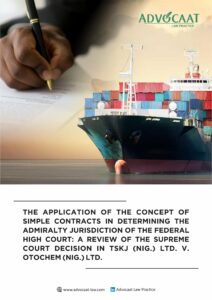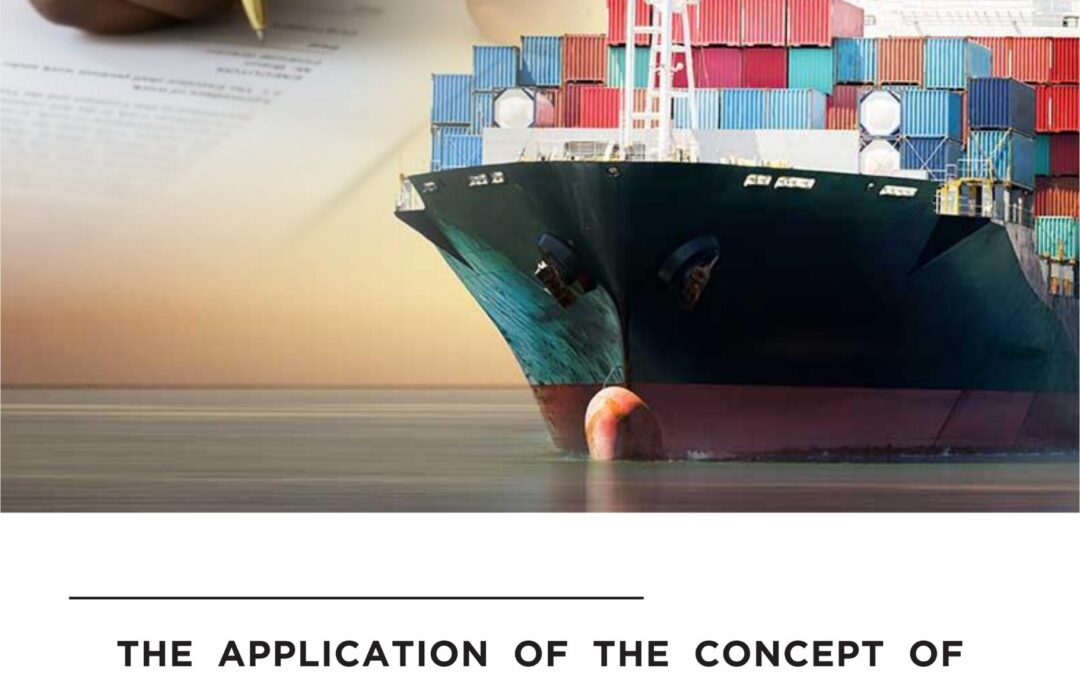
BACKGROUND
The jurisdiction of a court to entertain a matter is conferred on the court by the Constitution of the Federal Republic of Nigeria 1999 (as amended) or by the statute that created the court. Section 251(1)(g) of the Constitution confers on the Federal High Court the competence to entertain any admiralty matters in Nigeria to the exclusion of all other courts in the country. It is interesting to note that the scope of this admiralty jurisdiction of the Federal High Court has become less clear following a number of recent court decisions. Prior to the promulgation of the 1999 Constitution, there existed a jurisdictional tussle on admiralty matters between the Federal High Court and the State High Courts. The Supreme Court resolved this jurisdictional wrangling in SAVANNAH BANK LIMITED V. PAN ATLANTIC SHIPPING & TRANSPORT AGENCIES[1]where the Court held that the Federal High Court and the State High Courts had concurrent jurisdiction over admiralty matters. The 1999 Constitution further settled the issue in section 251(1) which provides that the jurisdiction of the State High Courts is subject to the exclusive jurisdictional competence of the Federal High Court on specific subject matters listed in section 251, which includes “any admiralty jurisdiction.”
The application of the concept of simple contracts within the context of the subject matter jurisdiction of the Federal High Court has unsettled and rendered less defined the admiralty jurisdiction of the Federal High Court. The Supreme Court has endorsed the position that the Federal High Court does not possess jurisdiction in respect of simple contracts. Instead, it is the State High Courts that can exercise jurisdiction in respect of simple contractual claims.[2] This has created uncertainty regarding the admiralty jurisdiction of the Federal High Court as most admiralty matters are based on simple contracts.
The case under review examines the application of the concept of simple contracts by the Supreme Court in determining the admiralty jurisdiction of the Federal High Court. It also highlights the implication of the decisions for the maritime industry.
BRIEF FACTS
The Respondent commenced this action at the Rivers State High Court claiming, among other reliefs, the sum of N14,800,000.00 (Fourteen Million, Eight Hundred Thousand Naira only), (the equivalence of 38,845 US Dollars)[3] representing hire rentals of the houseboat Prince III. It was the Respondent’s case that it delivered the houseboat to the Appellant for the temporary use of the Appellant’s staff. After the delivery of the houseboat to the Appellant, the Appellant requested that the houseboat be upgraded to European executive standard. Pursuant to this
request, the Respondent claimed to have carried out further modification of the houseboat while the houseboat was in possession of the Appellant. Upon the completion of the modification, the Respondent alleged that the Appellant refused and or neglected to make payment for the hire of the houseboat. The Appellant denied the Respondent’s claims and contended that it did not take delivery of the houseboat because the Respondent failed to meet the delivery deadline and also because the boat did not meet the required standard.
At the conclusion of the trial, the High Court found as a fact that there was a contract between the parties involving the hire of the houseboat. The Court, among other reliefs, awarded in favour of the Respondent the sum of N8,800,000.00 (Eight Million Eight Hundred Thousand Naira), (the equivalence of 23,097 US Dollars) being the hire rentals of the houseboat. On appeal, the Court of Appeal upheld the decision of the High Court. The Appellant further appealed to the Supreme Court. One of the issues submitted for the consideration of the Supreme Court was whether the Respondent’s claim fell within the admiralty jurisdiction of the Federal High Court as to rob the High Court of Rivers State
the jurisdiction to entertain the suit. The Appellant referred to sections 251 and 272 of the Constitution and argued that the High Court of Rivers State did not have the requisite jurisdiction to entertain the suit. On its part, the Respondent argued that the High Court of Rivers State had the jurisdiction to hear and determine the suit as the suit was based on a simple case of debt owed by the Appellant to the Respondent which arose from breach of contract of hire of a houseboat and that the claim did not arise in the main nor touch on anything admiralty to oust the jurisdiction of the High Court of Rivers State. The Supreme Court held that the Rivers State High Court had the jurisdiction to hear the case.

Order via Legalnaija.com/shop
BASIS OF THE COURT’S DECISION
In arriving at its decision, the Supreme Court considered the provisions of section 251(1)(g) and 272(1) of the Constitution. Section 251(1)(g) of the Constitution provides as follows:
“Notwithstanding anything to the contained in this Constitution and in addition to such other jurisdiction as may be conferred upon it by an Act of the National Assembly, the Federal High Court shall have and exercise jurisdiction to the exclusion of any other court in civil causes and matters –
- any admiralty jurisdiction, including shipping and navigation on the River Niger or River Benue and their affluents and on such other inland waterway as may be designated by any enactment to be an international waterway, all Federal ports, (including the constitution and powers of the ports authorities for Federal ports) and carriage by sea.”
Section 272 of the Constitution provides that:
“Subject to the provisions of section 251 and other provisions of this Constitution, the High Court of a State shall have jurisdiction to hear and determine any civil proceedings in which the existence or extent of a legal right, power, duty, liability, privilege, interest, obligation or claim is in issue.”
The Court also considered 26 of the Admiralty Jurisdiction Act, 1991 which defines a ship as “a vessel of any kind used or constructed for use in navigation by water, however it is propelled or moved.…”
The Supreme Court affirmed the finding of the High Court that the transaction between the parties was a hire of the houseboat. Muhammed J.S.C who delivered the lead judgment regarded the transaction as “a simple contract and not an admiralty or maritime matter. This is because…the action filed before the trial court is for the recovery of accrued and unpaid hire rentals for a houseboat let to the appellant by the respondent and damages for breach of the contract.” The Court held further that the fact that a houseboat comes within the meaning of a ship under section 26 of the Admiralty Jurisdiction Act cannot convert an agreement for hire of houseboat into an admiralty agreement. The mere fact that a ship is involved in a simple contract does not automatically make that simple contract a subject for jurisdiction in admiralty matters. The Court concluded finally that “This case of a simple contract of debt recovery is within the civil jurisdiction of the Rivers State High Court and it properly assumed jurisdiction on the matter.”
COMMENTARY
With all due respect to the Supreme Court, the decision under review is contrary to the express provisions of the Admiralty Jurisdiction Act which defines in detail the admiralty jurisdiction of the Federal High Court. Section 1(1)(a) of the Admiralty Jurisdiction Act specifies that the admiralty jurisdiction of the Federal High Court includes the jurisdiction “to hear and determine any question relating to a proprietary interest in a ship or aircraft or any maritime claim specified in section 2 of this Act.” Section 2 of the Admiralty Jurisdiction Act enumerates several claims that fall within the admiralty jurisdiction of the Federal High Court. In particular, section 2(3)(f) of the Act provides for “a claim arising out of an agreement relating to the carriage of goods and persons by a ship or to the use or hire of a ship, whether by charter-party or otherwise.”[4] These provisions of the Admiralty Jurisdiction Act are very clear and unambiguous. It is settled law that where the words used in a statute are plain and unambiguous, the courts are enjoined to give the words their ordinary and natural meaning without embarking on a voyage of discovery.[5]
The Respondent’s claim in the decision under review, being a claim relating to the hire of a houseboat, falls squarely within the purview of section 2(3)(f) of the Admiralty Jurisdiction Act, and as such falls within the admiralty jurisdiction of the Federal High Court. Surprisingly, the Supreme Court did not consider the provisions of sections 1(1)(a) and 2(3)(f) of the Admiralty Jurisdiction Act in arriving at its decision, even though the Appellant relied on these sections in its argument.
The Admiralty Jurisdiction Act which defines the scope of the admiralty jurisdiction of the Federal High Court provides for different types of agreements and transactions that are within the admiralty jurisdiction. Some of these agreements and transactions are mortgage of a ship, carriage of goods, supply of goods or materials to a ship for its use or maintenance, provision of services to a ship, shipbuilding, repair of ship, and so on.[6] All these are based on contracts. The decision that the Federal High Court lacks the jurisdiction to hear and determine any claim based on simple contracts has the effect of stripping the Federal High Court of its admiralty jurisdiction as most of the items of claims enumerated in section 2 of the Admiralty Jurisdiction Act can only be actualized by means of contracts.
It is particularly worrisome that in June 2020, the Supreme Court in CRESTAR INTEGRATED NATURAL RESOURCES LIMITED V. SHELL PETROLEUM DEVELOPMENT COMPANY OF NIGERIA LIMITED[7] held that “There is no aspect of breach of contract, be it a simple or complex contract, that the Constitution in Section 251(1) thereof, confers jurisdiction on the Federal High Court to adjudicate on.”
The law is clear that a court is competent to exercise jurisdiction whenever the subject matter of the claim is within the jurisdiction of the court. It is the subject matter of a contract and not the existence of the contract that determines the jurisdiction of a court. Using the existence of a contract as a test for determining jurisdiction, instead of the subject matter of the contract, has the effect of stripping the Federal High Court of the admiralty jurisdiction duly conferred on it by the Constitution.
The obvious implication of the decision under review is that ship owners, charterers, seafarers and consignees have lost the opportunity to commence admiralty actions at the Federal High Court where the action is based on contract.
For further enquiries, please contact:
|
|
|
||||||
[1] (1987) 1 NWLR (Pt. 49) 212; (1987) LPELR-SC 139/1985.
[2] ONUORAH Vs. KADUNA REFINING & PETROCHEMICAL CO. LTD (2005) LPELR-2707 (SC).
[3] At the exchange rate of 381 Naira to 1 US Dollar
[4] Underlining for emphasis
[5] See Aromolaran v.Agoro (2014) 18 NWLR (pt. 1438) 153
[6] See section 2 of the Admiralty Jurisdiction Act
[7] SC/765/2017 delivered by the Supreme Court on 5th day of June 2020

